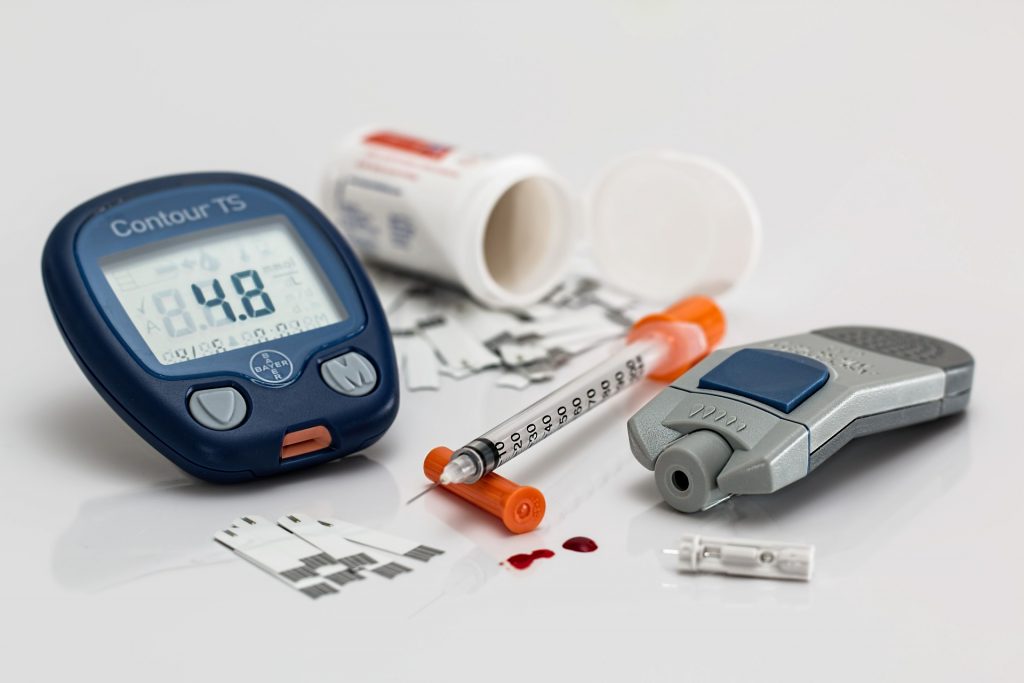Maybe you have been recently diagnosed with diabetes. Maybe diabetes runs in your family. Or maybe you just want to know what you can do to prevent diabetes in you or your children. Whatever the case, the resources below will help you better understand what diabetes is and how you can prevent and manage it.

Who has diabetes?
Affecting around 30 million Americans, diabetes is one of the most common chronic conditions in the United States. The CDC’s Diabetes Atlas shows that in Philadelphia, 10.4% of the population has been diagnosed with diabetes. Diabetes also disproportionately affects people of color; according to the CDC’s 2017 Diabetes Report Card, 12.7% of African-American adults are diagnosed with diabetes, compared to only 7.4% of White adults.
For more information on diabetes trends, check out the 2017 Diabetes Report Card from the CDC.
What is diabetes?
Diabetes is a long-term condition that affects how your body turns food into energy. When you eat food, something called insulin usually converts the sugar that goes into your blood into energy in your body’s cells. But when you have diabetes, your body has trouble making or using insulin. This means that the sugar stays in your bloodstream and doesn’t turn into energy. When this happens frequently, it can lead to problems with your heart, vision, or kidneys.
What Is Diabetes?: This short video from the CDC explains how diabetes affects the body.
Diabetes Myths & Facts: There are a lot of myths out there about diabetes. Find out what’s true and what’s not!
There are 3 types of diabetes:
- Type 1 diabetes: Type 1 is far less common that type 2 and is diagnosed at a younger age. With type 1 diabetes, your body stops making insulin.
- Type 2 diabetes: This is the most common form of diabetes (makes up 90% of diabetics) and is usually diagnosed in adults. With type 2 diabetes, your body has trouble keeping blood sugar at normal levels.
- Gestational diabetes: This type develops in pregnant mothers, usually disappearing after the baby is born, but puts mother and child at a higher risk for developing type 2 diabetes later on.
Diabetes symptoms & testing
According to the CDC’s page on diabetes symptoms, you might want to get your blood sugar tested if you have any of the following symptoms:
- Urinate a lot, often at night
- Are very thirsty
- Lose weight without trying
- Are very hungry
- Have blurry vision
- Have numb or tingling hands or feet
- Feel very tired
- Have very dry skin
- Have sores that heal slowly
- Have more infections than usual
Risk Test: Take this 1-minute risk test from the American Diabetes Association to see if you might be at risk for diabetes.
Getting Tested: Find out more about the different tests doctors use to diagnose you with prediabetes, type 1, type 2, or gestational diabetes.
If you are a patient at a FIGHT clinic, you can ask your primary care doctor to test you.
Managing diabetes
If you have prediabetes or think you might be at risk for diabetes, the good news is that there are ways to prevent diabetes. Focus on eating healthy and getting regular exercise. To stay committed, you might want to join a CDC lifestyle change program. Find out more diabetes prevention tips on the CDC’s website.
If you have already been diagnosed with diabetes, the resources below will help you manage your diabetes and live a healthy life:
- Living with Diabetes: Learn how to eat healthy, stay active, manage your blood sugar, prevent related health problems, and more.
- Managing Diabetes: This page has a lot of good information on checking your blood glucose levels as well as working with your health care team.
- Insulin Basics: Find all about the different kinds of insulin available and what insulin does for you.
- Insulin, Medicines, & Other Diabetes Treatments: Find information on the different types of diabetes medications and their side effects, different ways of taking insulin, and other treatment options.
- Managing Insulin in an Emergency: In the case of a natural disaster, it may be difficult to get the insulin or the medical care you need. This page offers tips on what to do in this type of emergency.
- Understanding Diabetes and Mental Health: When you’re diagnosed with diabetes, it’s normal to feel stressed, angry, sad, or scared. Here are some self-care tips to boost your mental wellness.
More diabetes resources
- Find a Diabetes Education Program in Your Area: Enter your zip code to find the closest diabetes education program so you can get support from a diabetes educator who will help you stay healthy and give you tools to manage your diabetes. These programs are covered by Medicare and most insurance plans.
- Jefferson Diabetes Center: If you are in the Philadelphia area, this is a resource for diabetes blood tests, clinical care, diabetes education, and nutrition counseling.
- Diabetes in Older People: Type 2 diabetes often develops in older adults. Learn more on this page from the National Institute on Aging.
- American Diabetes Association: Get healthy recipes, connect with the diabetes community, and find out about current diabetes research.
- Centers for Disease Control and Prevention: Join a diabetes awareness campaign, find diabetes data and statistics, and much more.
- Medline Plus: This round-up of diabetes resources from across the web includes links to diabetes pages in Spanish.
- National Institute of Diabetes and Digestive and Kidney Diseases: The official diabetes site of the US Department of Health and Human Services, this page links to a variety of diabetes topics – including financial help for diabetes care, diabetic eye disease, and more.